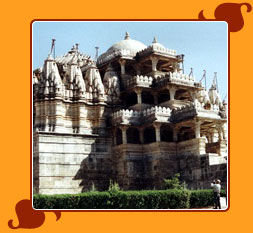Ranakpur is located in the mountain ranges of Pali
district, 23 kms. away from the Phalna railway station. Ranakpur is reached
after passing lush green valleys and streams and the heart capturing views
drive away any fatigue of the journey. The Ranakpur Jain Temple were built
during the reign of the liberal and gifted monarch Rana Kumbha in the 15th
century. An enormous basement covers 48,000 sq. feet area. There are four
subsidiary shrines, twenty four pillared halls and eligibly domes supported
by over four hundred columns.
 History
of Ranakpur
History
of RanakpurThis charming village has derived its name after Rana
Kumbha. Well-known for some excellently carved 15th century Jain temples in
amber stone, Ranakpur is one of the five holiest places of the Jains and
flaunts outstanding natural beauty. Dharna Sah, who happened to be a Jain
businessman, approached Rana Kumbha when he had the vision of his great
temple to request a portion of land for its construction.
The
magnificent Jain temples were built during the rule of the open-minded and
gifted monarch Rana Kumbha during the 15th century. The basement of the
complex covers 48,000 sq. feet area and features four additional shrines,
twenty four pillared halls and domes supported by more than four hundred
columns. There are 1,444 columns and all of them are intricately carved with
different appearance. The inventively engraved nymphs playing the flute in
various dance positions at an elevation of 45 feet makes for an absorbing
sight.
Ranakpur Jain TempleRanakpur Jain
Temple is famous for its excellent sculptures and architecture. Surrounded
by the Aravali hills and located on the banks of 'Magai' river this grand &
gigantic four facet structures was erected in the 14th Century. The Temple
is three storied, 102 ft. high and its spread over an area of 48000 sq. ft.
The present structure of the temple came into being after the hard works of
50 years by various artisans & sculptors.
The land of this
temple which situated at the foot hill of 'Madri hills' was gifted by
Maharana Kumbha of Mewar. Along with this temple a small town, about 2 kms.
from the temple also came into existence. this town got its name from 'Rana'
& was named 'Ranpur' which later came to be known as 'Ranakpur'.
The
temple is dedicated to the first Jain Teerthkar 'Lord Adinath'. it is built
on high platform, which has about nine basement. it has 84 idols of gods and
demi gods., 1444 pillars elaborately and beautifully decorated along with 4
'Megh Mandaps'. surrounding the main temple there are small shrines of Lord
'Parshwanath','Neminath'& 'Surya Narayan'.
Best
Season, Climate and Clothing Climate-wise Ranakpur remains hot
during the summers and the mercury often touches 42 degrees Celsius and
during the winter season the temperature can touch down to 10 degree
Celsius. The rainy season begins from July and lasts till the midst of
September with about 90 percent humidity in the air. For the summers, light
cottons would be the best and for the winters, light woolen clothing is
recommended. If you are planning to spend vacations in this amazing town
then the recommended time is during the months of October to March.
Touristplacesinindia.com is your authentic travel guide to Ranakpur and
provides useful information on the hotels and tourist attractions in
Ranakpur.
Other Places:Sadri
(8 km): Famous for some beautiful temples and an old Dargah of
Khudabaksh Baba. The Varahavtar Temple and the Chintamani Parasvanath Temple
are the most ancient of the temples situated here.
Desuri
(16 km): Three temples, dedicated to Lord Shiva, Lord Hanuman and Navi
Mata are among some noteworthy temples at Desuri. An old mosque situated
here is also worth a visit. A temple dedicated to Parsuram Mahadeo,nestled
in the hills, is also close by. It is situated in the Kumbhalgarh tehsil of
Rajsamand.
Ghanerao: Ghanerao abounds in Hindu
temples. Most notable is the temple of Gajanand with a life-size statue of
the goddesses Ridhi and Siddhi. The statue is guarded by Hanuman and Bhairon
on either side.
Muchhal Mahaveer: This temple is
situated about 5 km from Ghanerao in the Kumbhalgarh Sanctuary. Its
distinctive feature is the statue of Lord Mahavira with a mustache. The two
statues of elephants guarding the gateways are splendid examples of
architecture. In the vicinity are the Garasia tribal villages famous for
their colourful costumes.






 History
of Ranakpur
History
of Ranakpur